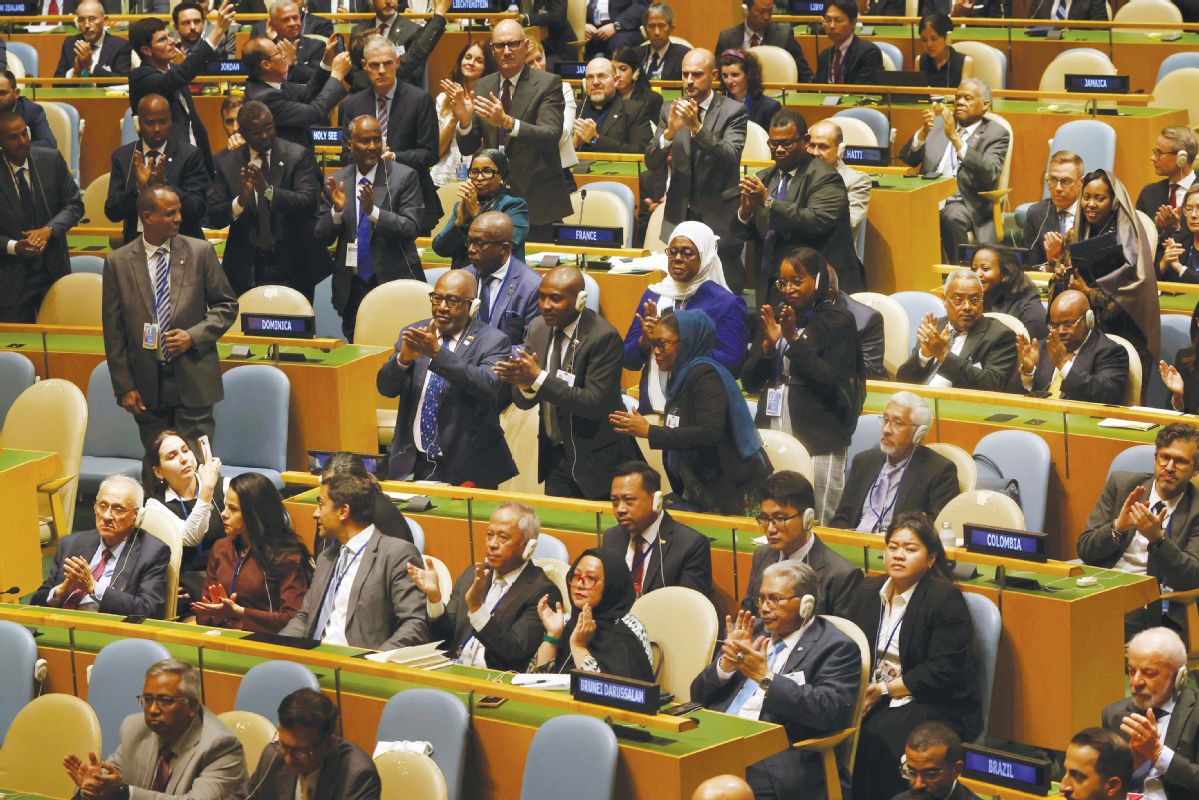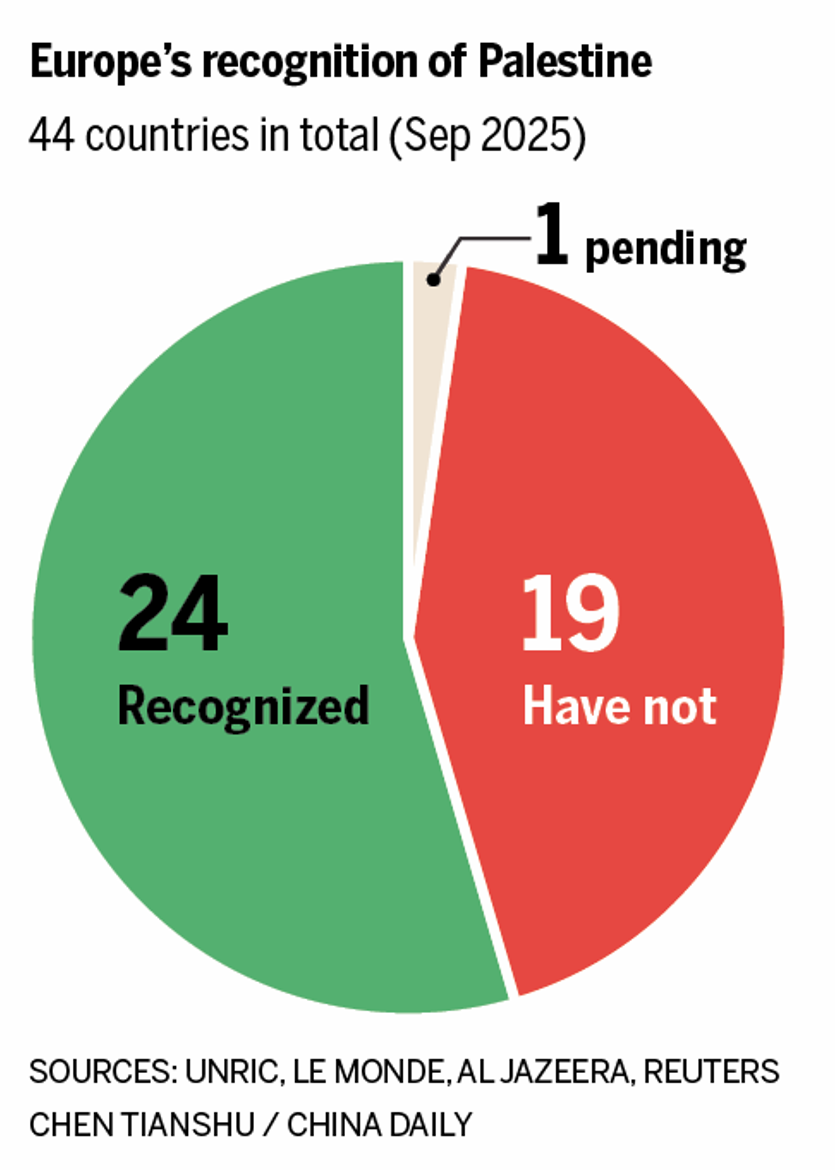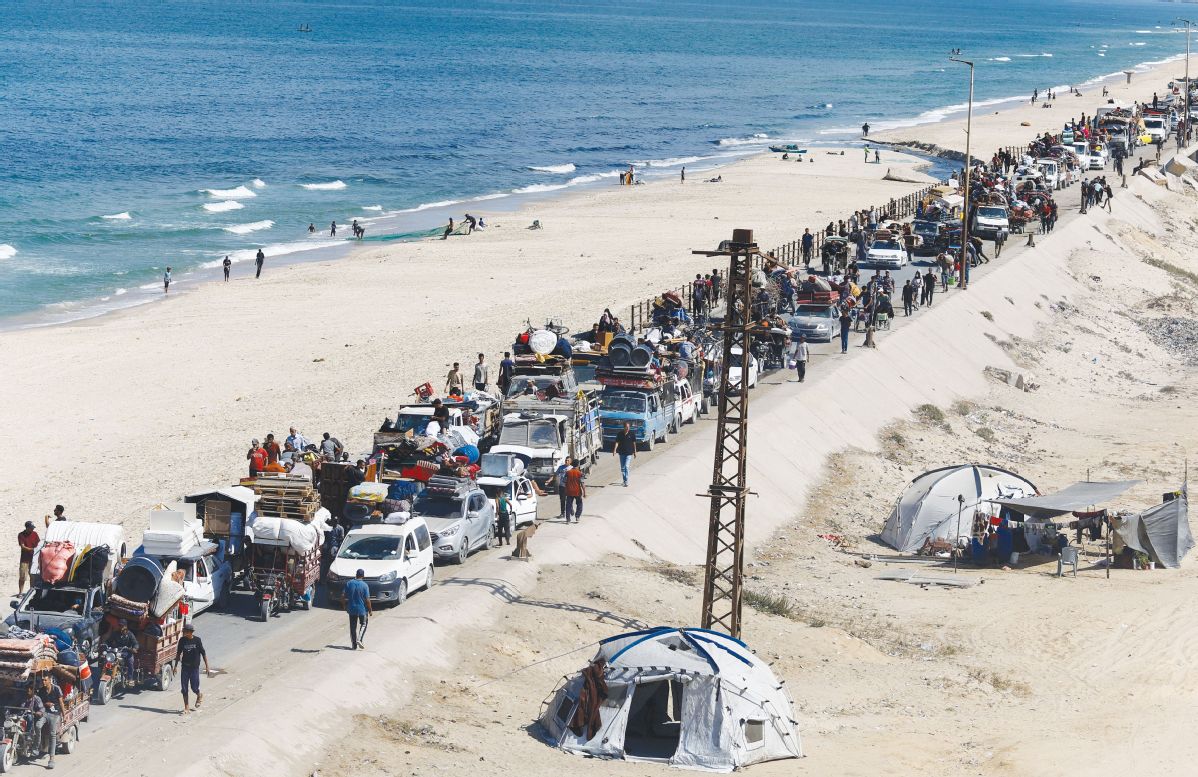Europe recognizing Palestine
Shift in political landscape behind the move as humanitarian crises trigger pro-Gaza protests across continent


At the 80th session of the United Nations General Assembly on Tuesday — two days after Australia, Canada, Portugal, and the United Kingdom did it — Andorra, Belgium, France, Luxembourg, Malta, and Monaco formally announced their recognition of the Palestinian state, pushing the number of UN members that recognize Palestine to more than 150.
Among them, European countries have been leading the West in its recent shift in stance and 24 out of 44 European nations have now recognized Palestinian statehood.
"The time has come," France's President Emmanuel Macron said at the gathering in comments that were recorded and put on his official X account. "That is why, true to my country's historic commitment in the Middle East, for peace between the Israeli people and the Palestinian people, I declare that France today recognizes the State of Palestine."
The official mission of Palestine to the United Nations posted a world map on social media on Monday, with the majority of countries marked as recognizing Palestine as a state. A smaller group, most notably including the United States and Germany, still does not.
With the latest wave of recognition, the map looks increasingly lopsided, raising questions about not only the Middle East situation but also an ongoing shift in Europe's political spectrum.
Public opinion urged change
"If you look at the world map now, today, for all the countries that recognize Palestine, it's a vast majority of the whole world," said Jeremy Corbyn, a former leader of the UK's Labour Party and a member of the UK Parliament. "That's only happened because of consistent campaigning by Palestinians and sympathizers all over the world."
Protesters calling for a "Free Palestine" appear outside many EU institutions in Brussels, Belgium on certain days of the week. They sometimes also hold dances in the local squares in a bid to attract locals.
In June, Greta Thunberg, who is widely known as a climate activist, joined a humanitarian mission that was attempting to deliver supplies to Gaza by boat via the Mediterranean Sea.

Monitored by Israeli drones, her vessel was intercepted and she and her companions were arrested before they were sent back. The image that prevailed was of a young activist confronting state power and it captured the imagination of people on social media, transforming the previously somewhat controversial activist into a symbol of courage and moral clarity.
Koert Debeuf, a distinguished adjunct professor in Middle East studies at the Brussels School of Governance, said the deteriorating situation in Gaza, where "the ground invasion by Israel has reached a point where the disasters are already massive," had shocked people in Europe and pushed public opinion to such an extent that nations were nudged toward recognizing Palestine.
The events in Gaza, perhaps more than any diplomatic maneuvers, had made a deep impression on public opinion, he said, listing images of devastation, civilian casualties, and humanitarian crises that have resonated across the continent, prompting both ordinary citizens and political leaders to reassess their positions.
On Sept 16, the Independent International Commission of Inquiry on the Occupied Palestinian Territory, which was established by the UN Human Rights Council in 2021, released a 72-page report saying Israel had committed genocide against Palestinians in Gaza. It listed four deeds carried out by Israel: namely the targeting civilians and other protected people, causing serious bodily or mental harm, deliberately inflicting conditions calculated to bring about destruction, and imposing measures intended to prevent births.
"The commission has found that the Israeli security forces have intentionally killed and seriously harmed an unprecedented number of Palestinians in Gaza since Oct 7, 2023 using heavy munitions," the report concluded.
Ding Chun, director of the Center for European Studies at Fudan University in Shanghai, said Gaza has acted as a mirror for European conscience.
"The humanitarian disaster in Gaza, along with Israel's actions, has triggered deep reflection among European political elites and the general public on the Palestinian-Israeli conflict and its possible solutions," he said. "It is also a response to the growing call for justice, both domestically and internationally. Europeans have come to recognize that the humanitarian catastrophe in Gaza leaves no alternative but to work toward the two-state solution as the correct and long-term path to peace."

Debeuf observed that public sentiment in Europe is so strong it has even reached the highest levels of European institutions.
"In the European Commission, President Ursula von der Leyen has proposed sanctions. For her this is an extraordinary position — but the pressure is becoming overwhelming. There is almost nothing else they can do but take action," he said.
During a news briefing in London on Tuesday, John Rees, a national officer of the Stop the War Coalition, also said: "I think a lot of countries in Europe are under enormous pressure from popular movements in their countries."
EU and US stances drift apart
Then what about the US, where "Free Palestine" protests are no less weak than in Europe?
For Jian Junbo, director of the Center for China-Europe Relations at Fudan University in Shanghai, the fact that eight European nations have recognized the Palestinian state signals the growing diplomatic independence of Europe and that it is further distancing itself from its traditional close ally.
"The two sides, although with the majority of European nations being US military allies engulfed under the NATO systemic framework, already stand sharply against each other on the topic," he said, listing the US' firm objection votes against a two-state solution on various occasions as an example.
Actually, when the UN adopted the famous two-state solution in 1947, major European nations and the US voted in favor while the UK abstained, which was widely thought to be connected to its own colonial interests.
Then, with the advent of the Cold War, US support for the two-state solution remained largely oral because of its special relationship with Israel, while the UK gradually changed course and started to support the solution, which it has done since the Venice Declaration of 1980.

Debeuf went further by pointing out that divisions between the two sides across the Atlantic have been growing since the start of US President Donald Trump's administration, which threatened to levy high tariff rates against Europe and required the latter to invest more in its defense.
"Actually, the United States pushed for more European independence and that's what Europeans are doing slowly but surely," Debeuf said.
But he also pointed out that Europe does not want to push the US too hard and noted that the UK prime minister was not present at the UN meeting when the European nations announced their decision.
Di Dongsheng, dean of the School of Global and Area Studies at Renmin University of China, offers a different interpretation.
"This is less about Europe versus the United States, and more about Europe versus the Trump administration," he argued. "The administration occupies an extreme position on the political spectrum, pushing Israel's (Benjamin) Netanyahu government to act without restraint. That runs counter to mainstream values in Europe. In this sense, Europe is not rejecting the United States as a whole, but rejecting the excesses of Trump-era politics."
Maybe the West in division can learn from the East, Ding said, stressing the importance of concrete steps.
"Beyond symbolic declarations, practical actions are needed," he said, pointing out how in July 2024 China facilitated an agreement among 14 Palestinian factions that signed the Beijing Declaration on Ending Division and Strengthening Palestinian National Unity.
"This pragmatic spirit is worth absorbing worldwide," Ding emphasized. "China and Europe share similar perspectives on the Palestinian question. By working together, they could play a constructive role in easing tensions and moving toward peace."
Xing Yi in London contributed to this story.
Contact the writer at zhangzhouxiang@chinadaily.com.cn.
























